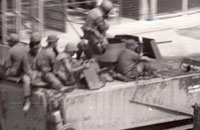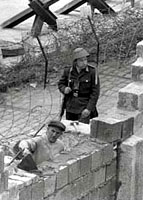FDR as "Halfway Wilsonian"
Professor John Moser examines the foreign policy of Franklin D. Roosevelt, comparing and contrasting it to the policies of Woodrow Wilson.
Link dead.
Professor John Moser examines the foreign policy of Franklin D. Roosevelt, comparing and contrasting it to the policies of Woodrow Wilson.
Link dead.
Professor John Moser examines Abraham Lincoln and Secretary of State William H. Seward's establishment of the power of the federal government over that of the state governments and the implications this had for foreign policy. Moser considers the Civil War as the possible origin of U.S. nationalism.
Dead link.
Professor Jeremi Suri details the life and foreign policy views of John Quincy Adams, examining how Adams merged popular nationalism with international realism.
Dead link.
Professors Sidney Milkis and Marc Landy look at the presidencies of Theodore Roosevelt and Woodrow Wilson, comparing and contrasting their interpretations of progressivism and their stands on foreign affairs.
Link dead.
This three-day workshop examines the life of Winston Churchill. Participants will develop strategies for applying historical content in the classroom and across the curriculum.

This massive website furnishes several large collections. The Oral History Project presents full transcriptions of more than 475 audio oral histories conducted with U.S. men and women who served in Vietnam. The Virtual Vietnam Archive offers more than 408,000 pages from over 270,000 documents regarding the Vietnam War in addition to a number of video interviews.
The site focuses on military and diplomatic history, but aims to record the experiences of ordinary individuals involved in Vietnam and on the home front. Additional items address Thailand, Laos, and Cambodia, as well as Americans and Vietnamese. Secondary and reference resources are also available, including conferences papers, and video versions of a 1996 address by former ambassador William Colby on "Turning Points in the Vietnam War."

These more than 350 recently declassified documents from archives of former Warsaw Pact countries and the U.S. reveal previously hidden aspects of Cold War military strategy. The project offers documents and accompanying analyses in six categories: Warsaw Pact records; Warsaw Pact war plans; NATO records (U.S. and British); national perspectives (Bulgaria, Romania, Hungary, China, and Poland); crises (Berlin and Libya); and intelligence.
The website also provides 13 oral history interviews with former officials, including two Eisenhower administration officers involved with NATO planning and nuclear weapons policies. Documents reveal a 1964 Warsaw Pact war plan for using nuclear weapons in a preemptive strike against NATO forces and a 1965 Hungarian Army exercise detailing the targeted destruction of Western cities, including Vienna, Munich, Verona, and Vicenza. A 30-page survey article assesses the new history written since the release of recent documents.